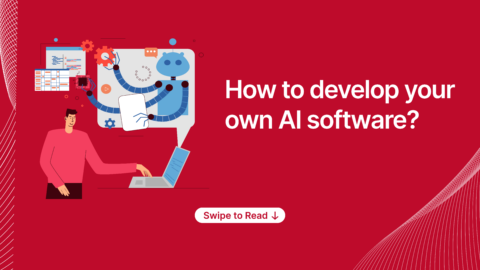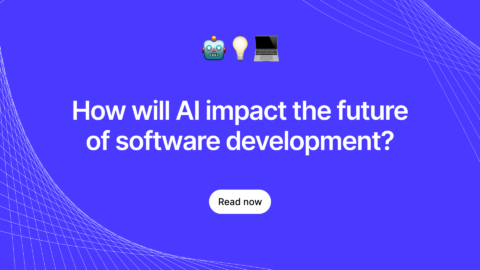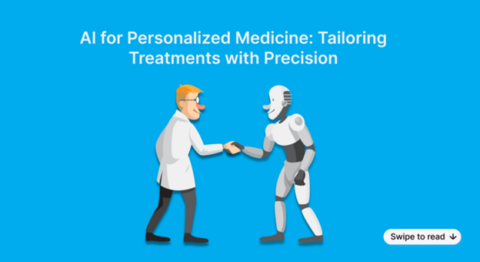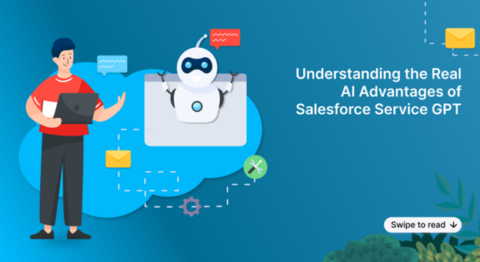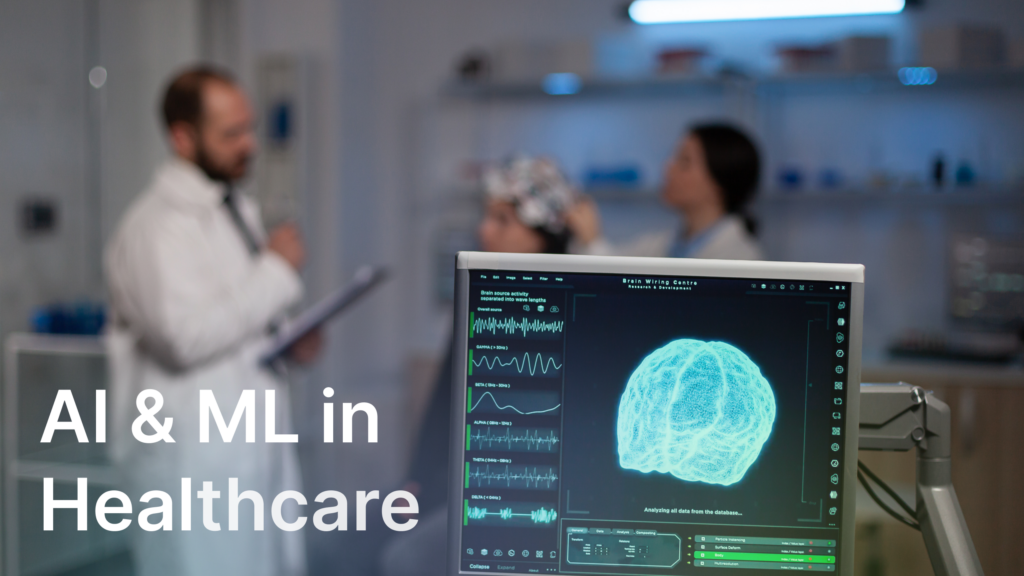
Healthcare comes at the top of the list when the concern is about adopting new technology, and AI & ML in Healthcare cannot be an exception. Despite new technologies emerging now and then, a huge gap still needs to be bridged between good & most effective patient care in the healthcare industry.
According to Statista, the Artificial intelligence (AI) healthcare market valued at 11 billion USD in 2021 will be worth 187 Billion USD by the end of this decade. It is evident that AI & ML applications will have a big role to play in transforming healthcare.
So, are you excited about how AI & ML can serve in healthcare?
You have landed at the right place as we will explore how the dynamic duo can transform healthcare with applications.
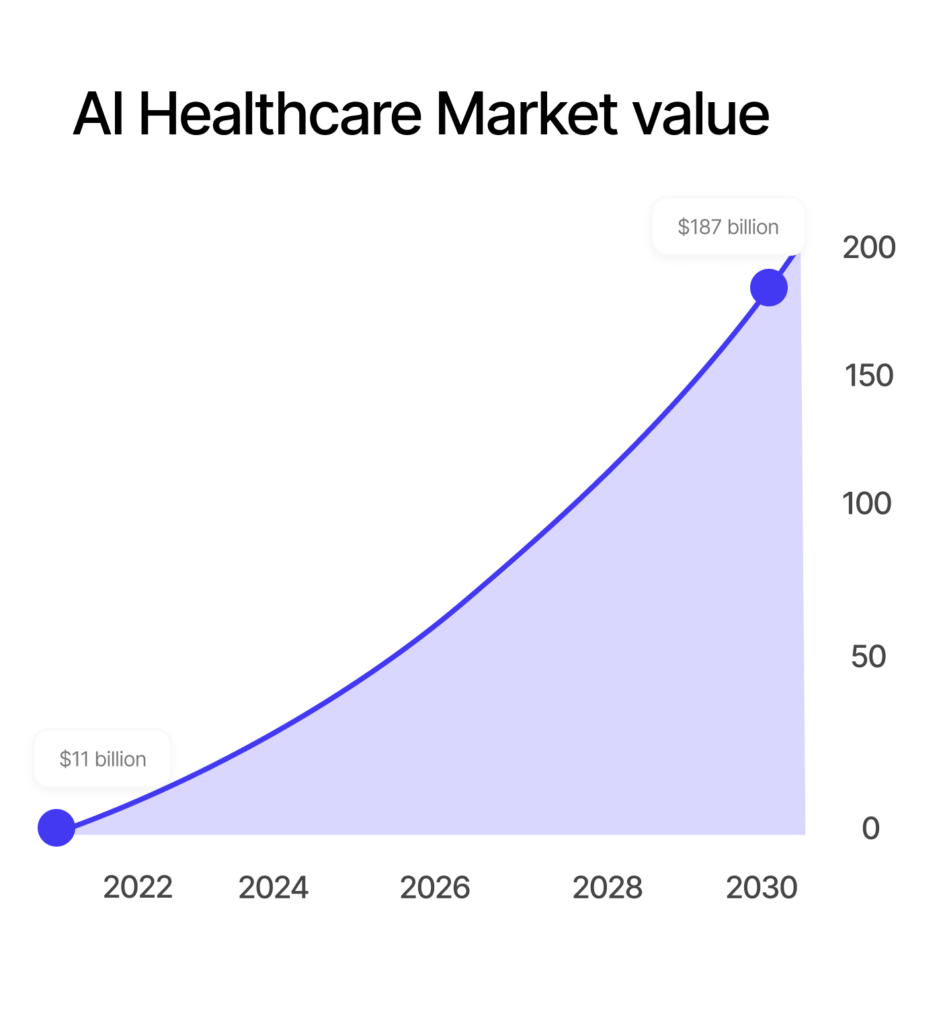
Current challenges in Healthcare Technology
Did you know that the US is the largest spender in healthcare in the world?
But, despite spending billions of USD, the individual health outcomes of the country are quite less when compared to any other developed country in the world. Here are a few more challenges associated with healthcare technology:
- Data Privacy and Security: Protecting sensitive patient data from breaches and unauthorized access.
- Interoperability: Ensuring seamless communication and data exchange between healthcare systems and devices.
- Regulatory Compliance: Navigating complex regulations and standards such as HIPAA, GDPR, and FDA approvals.
- User Adoption: Encouraging healthcare professionals to embrace and effectively use new technologies.
- Ethical Concerns: Addressing ethical dilemmas related to AI, automation, and decision-making in patient care.
One of the common problems clinics face is personalization, as all the millennials want diagnosis & treatment from the same place where they have dinner, “The Couch.”
The demand for digital consultation is rising, but the quality of healthcare and legacy systems pose a big challenge for healthcare institutions to provide quality care. This is where AI & ML can enter into the frame and uplift overall healthcare quality effectively.
Well, this is just one application of AI & ML in healthcare. Here’s how AI & ML can transform healthcare.
How can AI transform healthcare?
Despite the challenges mentioned above, the good news is that most large healthcare organizations have started providing room for AI in their daily practices. However, we are still in the early stages of the journey, but there is a lot to learn & implement which can make a difference.
Here are some of the applications of AI & ML in healthcare
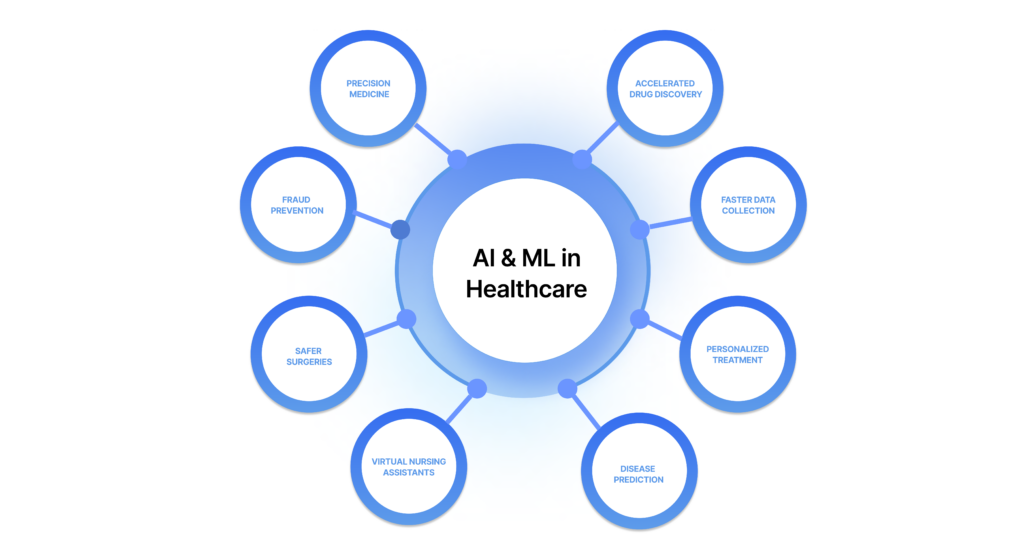
AI Applications in Healthcare
WORKFLOW MANAGEMENT
Despite modern technologies, most healthcare workers must spend much time on paperwork and administrative tasks. Artificial intelligence & automation can improve the productivity of repetitive tasks by automating them to free up employees for other activities. AI-assisted documentation can enable healthcare organizations to keep medical records safe and provide insights. AI can also help healthcare organizations in billing and document sharing across departments.
VIRTUAL NURSING ASSISTANTS
The development of virtual nursing assistants is one of the most promising AI applications in healthcare. These AI-powered companions offer patients round-the-clock assistance, answering questions, reminding them of drug schedules, and even providing emotional support. Virtual nursing assistants allow medical staff to focus more on essential and complex situations by relieving them of ordinary activities, thereby improving patients’ quality of care.
SAFER SURGERIES
AI has increased the precision and safety of surgical treatments. AI technologies assist surgeons in making informed decisions during surgeries by analyzing real-time data, lowering the possibility of errors. Furthermore, AI-powered robotic surgical devices enable minimally invasive operations, resulting in faster recovery and fewer postoperative problems.
FRAUD PREVENTION
The prospect of data breaches and medical identity theft remains big as healthcare systems digitize their operations. AI steps in to help by using complex algorithms to monitor and detect suspicious activity, ensuring patient data remains protected and secure. AI assists in the prevention of fraudulent claims and unauthorized access to healthcare information by detecting anomalous trends.
PRECISION MEDICINE
Precision medicine powered by AI is putting an end to one-size-fits-all methods of therapy. AI algorithms can forecast the most successful treatment procedures for individuals by analyzing large datasets such as genetics, patient history, and lifestyle. This focused strategy improves patient outcomes and decreases adverse drug reactions.
ML Applications in Healthcare
Many AI applications in healthcare rely on machine learning (ML). It allows computers to learn from data, predicting and making judgments based on patterns. The potential of machine learning in healthcare ranges from cost-effective processes to personalized treatment solutions.
COST-EFFICIENT PROCESSES
ML algorithms help hospitals run more efficiently by forecasting patient admissions, allocating resources, and optimizing workflows. This saves time while simultaneously lowering operational costs.
ACCELERATED DRUG DISCOVERY AND DEVELOPMENT
Machine learning speeds up drug research by analyzing large datasets to identify candidate molecules and predict their efficacy. This drastically reduces the time required to bring new medications to market.
FASTER DATA COLLECTION
ML algorithms can swiftly analyze and extract insights from vast medical data, from electronic health records to medical pictures. This increase in data processing speed allows healthcare practitioners to make more rapid judgments.
PERSONALIZED TREATMENT
ML algorithms provide patient profiles that assist clinicians in personalizing treatments to specific traits, resulting in improved treatment success rates.
DISEASE PREDICTION
AI algorithms can forecast the possibility of diseases such as diabetes, heart disease, and some types of cancer by finding small patterns and correlations in patient data. Early detection allows for timely action, which has the potential to save lives and improve prognosis.
Key Takeaway
Integrating AI applications in healthcare is ushering in a new era of patient care, diagnosis, and treatment. From virtual nursing assistants providing companionship and support to AI-driven precision medicine delivering tailored treatment plans, the potential of AI in healthcare is vast and transformative. As technology continues to evolve, the healthcare industry benefits immensely from AI’s power in delivering more efficient, accurate, and personalized care to patients worldwide.
How is Agira revolutionizing healthcare?
Agira Technologies’ innovative solutions can lead to more efficient healthcare delivery, improved patient outcomes, and enhanced collaboration among healthcare professionals.
- Telemedicine platforms for remote care.
- Get detailed insights with big data to track KPIs.
- Robust EHR systems for streamlined data management.
- Predictive analytics for proactive planning.
- Salesforce integration & management.
- Blockchain for secure data sharing.
- Health chatbots for instant support.
Ready to transform healthcare with cutting-edge technology? Join us in shaping the future of patient care and medical innovation.






